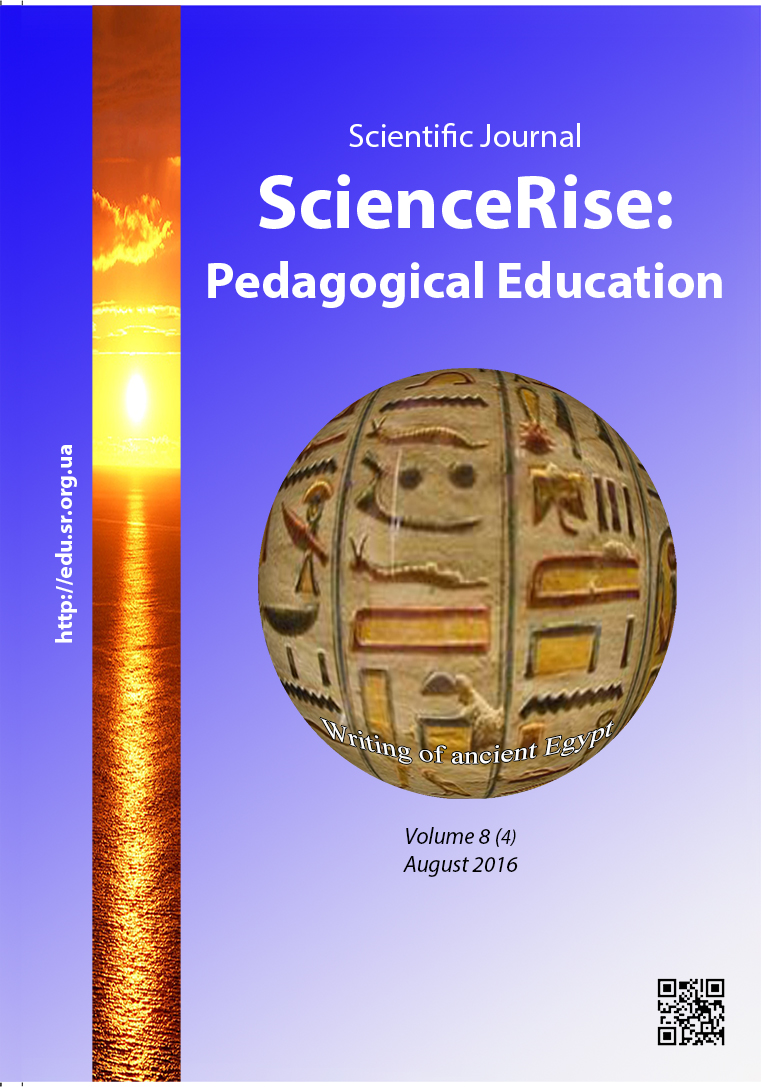Pedagogical conditions of future primary school teachers’ culturological training
DOI:
https://doi.org/10.15587/2519-4984.2016.76645Keywords:
future teachers of primary school, culturological training, pedagogical conditions, culturological preparednessAbstract
In the article is emphasized the topicality and importance of culturological training of the future teachers of primary school. The author tries to ground pedagogical conditions of this process on the base of results of current studies and analysis of scientific-pedagogical sources. The first condition is a guaranteeing of positive motivation of the future teachers of primary school. It is directed on overcoming of contradictions and negative stereotypes of culturological activity and formation of internal motivation for mastering the culturological knowledge and skills, development of cognitive activity and consciousness of the importance of reflexive position in personal and professional improvement. The second condition is a consciousness, understanding and mastering by the future teachers of the system of knowledge about culturological teaching and skills of its practical use in the context of modern requirements to the professional-pedagogical activity and personal qualities of teacher of the primary classes. The third condition is an involvement of the future teachers in active culturological activity. It is directed on the rational choice and combination of traditional and innovative methods and forms of culturological training of students, stimulation of their activity for mastering the structural components of culturological preparedness
References
- Khoruzha, L. L. (2003). Etychna kompetentnistʹ maybutnʹoho vchytelya pochatkovykh klasiv: teoriya i praktyka. Kyiv: Derzh. vyd-vo «Presa Ukrayiny», 320.
- Hrynʹova, V. M. (2015). Pedahohichna kulʹtura maybutnʹoho vchytelya. Pedahohichna tvorchistʹ, maysternistʹ, profesionalizm u systemi pidhotovky osvityansʹkykh kadriv: zdobutky, poshuky, perspektyvy. Kyiv: Vydavnytstvo NPU imeni M. P. Drahomanova, 432.
- Semchenko, V. A. (2004). Psykholohiya pedahohichnoyi diyalʹnosti. Kyiv: Vyshcha shkola, 335.
- Ivanova, T. V. (2001). Kulʹturolohichnyy komponent u pidhotovtsi maybutnʹoho pedahoha. Novi tekhnolohiyi navchannya. Kyiv, 34–38.
- Honcharenko, S. U. (2010). Pedahohichni doslidzhennya: metodolohichni porady molodym naukovtsyam. Kyiv; Vinnytsya: TOV firma «Planer», 308.
- Zyuzina, T. O. (2009). Kulʹturolohichna pidhotovka studentiv u vyshchykh navchalʹnykh zakladakh: teoretyko-metodolohichni zasady zmistu osvity. Luhansʹk: Vyd-vo DZ «LNU imeni Tarasa Shevchenka», 384.
- Naydʹonov, I. (2004). Bolonsʹkyy protses: kulʹturolohichni paradyhmy. Osvita i upr, 7 (2), 60–66.
- Rudenko, V. N. (2004). Kulʹturolohycheskye osnovanyya tselostnosty soderzhanyya vyssheho obrazovanyya. Pedahohyka, 1, 42–48.
- Kharytonova, S. V. (2013). Osnovnye strukturnye komponenty kulʹturolohycheskoy kompetentsyy. Sovremennye nauchnye issledovanija i innovacii, 7. Available at: http://web.snauka.ru/issues/2013/07/25475
- Shevnyuk, O. L. (2003). Kulʹturolohichna osvita maybutnʹoho vchytelya: teoriya i praktyka. Kyiv: Vyd-vo nats. ped. un-tu im. M. P. Drahomanova, 232.
- Holubenko, O., Chursin, M., Haydukov, V. (2007). Pro kulʹturnyy aspekt i vektor innovatsiy v osvitniy diyalʹnosti vyshchoyi shkoly. Kyiv: Pedahohichna dymka, 108–122.
- Semychenko, V. A. (2000). Priorytety profesiynoyi pidhotovky: diyalʹnisnyy chy osobystyy pidkhid. Neperervna profesiyna osvita: problemy, poshuky, perspektyvy. Kyiv, 176–203.
Downloads
Published
How to Cite
Issue
Section
License
Copyright (c) 2016 Тетяна Олександрівна Вінник

This work is licensed under a Creative Commons Attribution 4.0 International License.
Our journal abides by the Creative Commons CC BY copyright rights and permissions for open access journals.
Authors, who are published in this journal, agree to the following conditions:
1. The authors reserve the right to authorship of the work and pass the first publication right of this work to the journal under the terms of a Creative Commons CC BY, which allows others to freely distribute the published research with the obligatory reference to the authors of the original work and the first publication of the work in this journal.
2. The authors have the right to conclude separate supplement agreements that relate to non-exclusive work distribution in the form in which it has been published by the journal (for example, to upload the work to the online storage of the journal or publish it as part of a monograph), provided that the reference to the first publication of the work in this journal is included.







